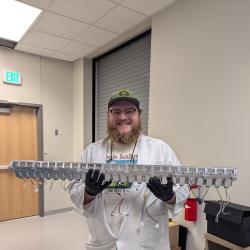Ellen D. Williams Named Fellow of the American Association for the Advancement of Science
UMD physicist recognized for her scientific contributions to nanotechnology as well as her leadership on technical issues in national security and policy
Ellen D. Williams, a Distinguished University Professor in the Department of Physics and the Institute for Physical Science and Technology at the University of Maryland, has been named a Fellow of the American Association for the Advancement of Science (AAAS). Election as a AAAS Fellow is an honor bestowed upon AAAS members by their peers, because of their scientifically or socially distinguished efforts to advance science or its applications.
 Williams, who works at the interface of energy technology and policy, is being honored “for distinguished contributions as a physicist to the field of nanotechnology, for her leadership and engagement with technical issues in national security, and for her advocacy of the need for sound technology to underpin policy issues,” according to AAAS.
Williams, who works at the interface of energy technology and policy, is being honored “for distinguished contributions as a physicist to the field of nanotechnology, for her leadership and engagement with technical issues in national security, and for her advocacy of the need for sound technology to underpin policy issues,” according to AAAS.
“I am honored to receive this award and delighted that it affirms the important role of scientists in providing clear technical assessments to support policy decisions,” Williams said.
Williams came to UMD in 1981 for a postdoctoral fellowship and rose to the rank of professor by 1991. At Maryland, she established an internationally recognized research program in experimental surface science, exploring fundamental issues in statistical mechanics and nanotechnology. She also pioneered the use of very powerful electron scanning, tunneling microscopes to study the surface of materials like silicon at the atomic level. In 1996, Williams founded the University of Maryland Materials Research Science and Engineering Center, serving as its director until 2009.
Williams served as the chief scientist for British Petroleum (BP) from 2010 to 2014, before her confirmation by the U.S. Senate as the director of the Advanced Research Projects Agency-Energy (ARPA-E) on Dec. 8, 2014. Launched with bipartisan support in 2009, ARPA-E’s mission is to advance high-potential, high-impact energy technologies that are too early in development for private-sector investment.
Williams returned to UMD in January 2017. Since then, she has been working to bridge policy and technology perspectives for clean energy innovation. Recently, she completed a report to the State of Maryland on “The Present Status and Future Potential of Maryland’s Clean Energy Innovation System.”
“Dr. Williams is continuing the long tradition of accomplished physicists turning their attention and skills to tackling major policy issues of the day—in her case, climate change and energy policy,” said Steven Rolston, professor and chair of the UMD Department of Physics. “We are lucky to have someone with her talents contributing to these issues, which are among most pressing facing humanity."
Williams has a distinguished history of professional service, including chairing the development of the National Academy of Sciences’ 2002 report on “Technical Issues Related to the Comprehensive Nuclear Test Ban Treaty” and providing extensive technical advice to the U.S. government, primarily through the Departments of Energy and Defense. As a member of the Congressional Commission on the Strategic Posture of the United States, Williams co-authored the 2009 final report titled “America’s Strategic Posture,” which provided more than 100 findings and recommendations on critical issues related to the U.S. nuclear strategy.
Williams received her bachelor's degree in chemistry from Michigan State University in 1976 and her Ph.D. in chemistry from the California Institute of Technology in 1981. She is a member of the National Academy of Sciences and a foreign member of the Royal Society (London). She is also a fellow of the American Academy of Arts and Sciences, the American Physical Society, and the American Vacuum Society. Williams has also been recognized by awards from the American Physical Society and the Materials Research Society.
Williams is one of 443 AAAS members to be named as a Fellow this year. New Fellows will be formally announced in the AAAS News & Notes section of the journal Science on November 29, 2019, and will be presented with an official certificate and a rosette pin on Saturday, February 15, 2020 during the AAAS Annual Meeting in Seattle, Washington.







